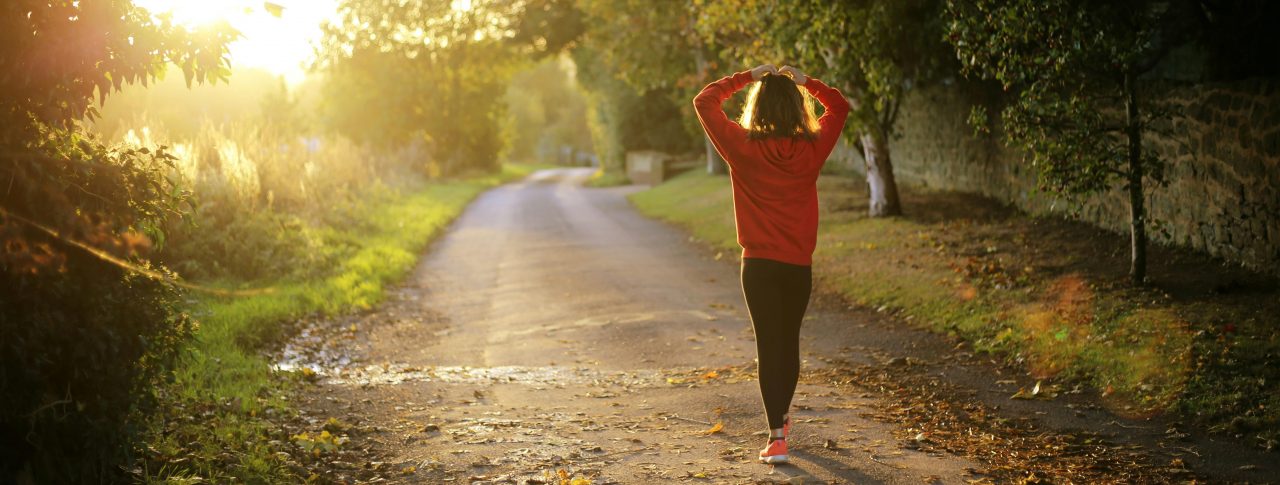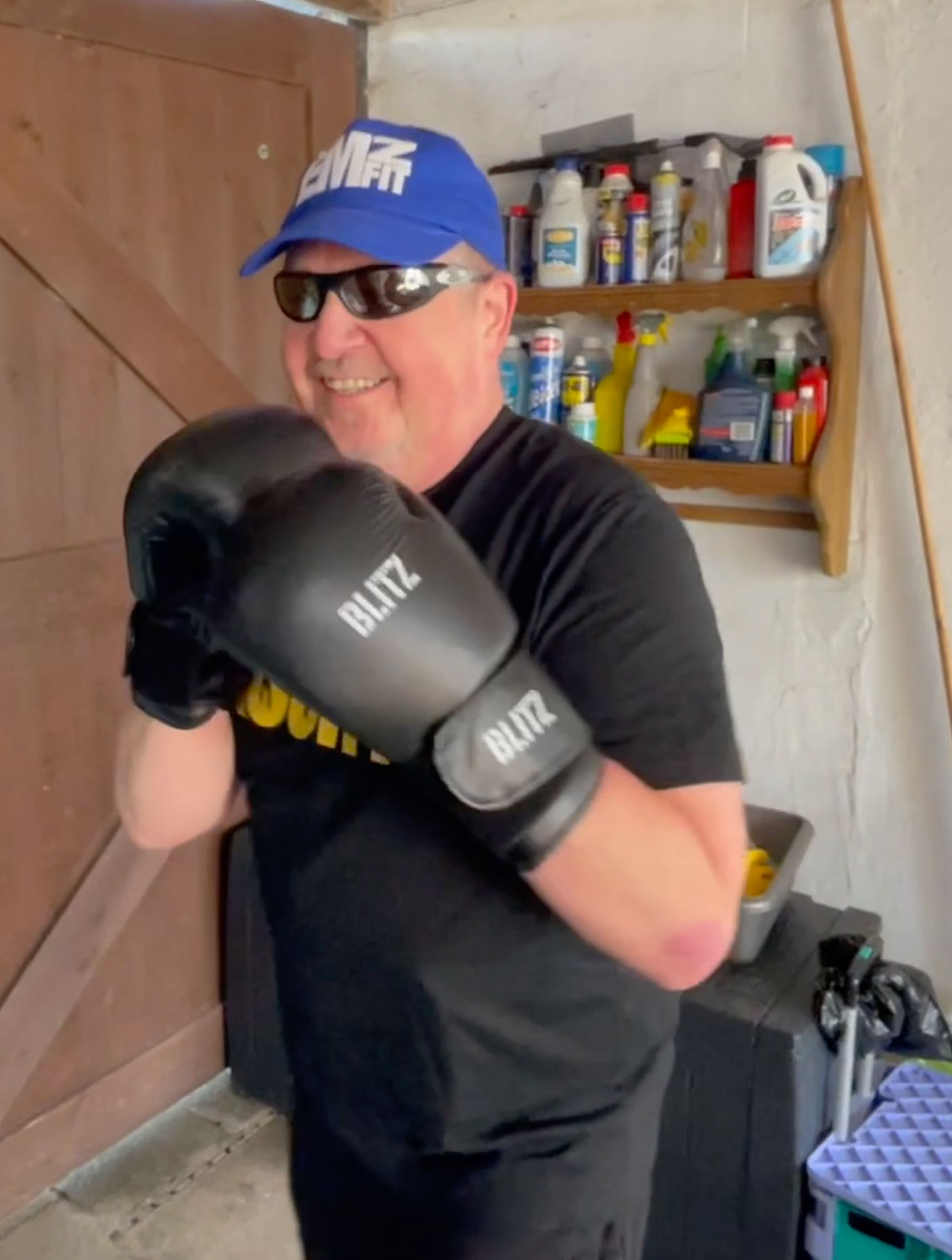Mental Health Awareness Week 2024
Sight Loss Councils are celebrating Mental Health Awareness Week, which takes place from 13-19 May. This year’s theme is ‘Movement: Moving more for our mental health.’
Mental Health Awareness Week (MHAW) was launched in 2001, by the Mental Health Awareness Foundation. The goal was to increase awareness of mental health and to encourage open discussions on the subject.
In this article, we showcase some of our Sight Loss Councils (SLC) members journeys with sport and fitness. By sharing their experiences, we hope to inspire other blind and partially sighted (BPS) people to actively participate in leisure activities, recognising the positive impact this can have on mental well-being.
Regularly being active leads to far reaching benefits including improvements to physical and mental health. This includes a positive attitude, the formation of friendship groups and improved independence in everyday tasks.
Running makes me feel free
Yahya Pandor, Gloucestershire SLC member, tells us how running has changed his life:
“Running has been a transformative journey for me since I began a year ago. I was never particularly active, even before sight loss, but I now love the freedom of movement, the rhythm of my steps, and the rush of air against my face. These have become my companions, leading me towards a healthier mind and body.
“As someone who is blind, the initial steps were daunting. But each stride has brought confidence and a deeper connection to the world around me.
“I urge fellow blind and partially sighted people to consider taking up a physical activity like running. It’s more than just the physical benefits, although those are significant. The mental clarity, the sense of accomplishment, and the camaraderie with other runners all contribute to a more fulfilling life.
“Of course there are challenges unique to us, but with the right support and determination, they can be overcome. From guide runners to accessible technology, there are tools and communities ready to help us lace up and hit the pavement. Let’s not let our vision impairment limit our potential to lead active, joyful lives.”
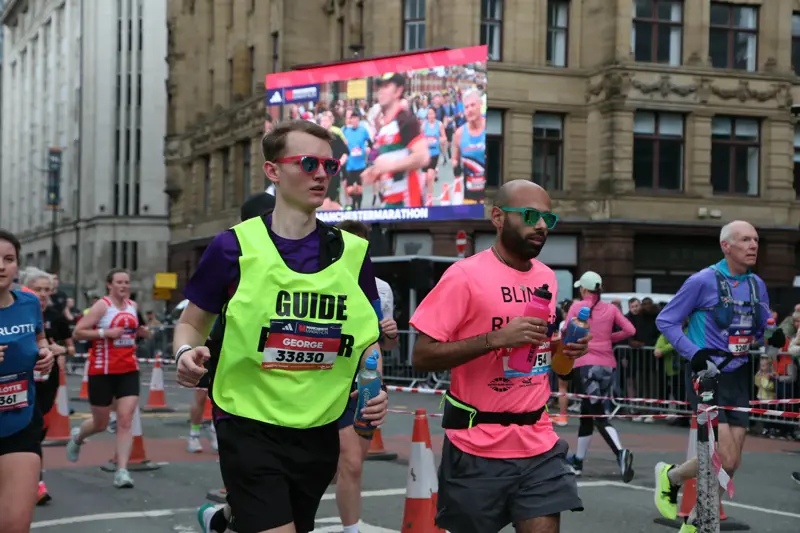
Yahya participating in the 2024 Manchester Marathon, shown running with his Guide Runner
Horses make me smile
Allison David, Lancashire SLC member, spoke to us about her love of horse riding and how riding has remained a constant, even during sight loss.
“I’ve been around horses since I was a teenager and my horse, Ted, has been a part of the family for over 20 years. Ted is a fairly small, black and white cob, the type you might have expected to pull an old caravan along the road. He has a very long mane and tail which he thankfully enjoys having brushed as it’s always getting knotted. This in itself is quite a ‘mindful’ activity.
“Horses make me smile. Their smell, the feel of their coat, the little noises they make when chewing the grass – there is so much to enjoy. Horses have a calming, peaceful way about them, and I often go into Ted’s stable and put my arms around his neck and simply breathe.
“There have been stressful moments with him over the years. He hates big, noises vehicles getting too close – don’t we all? – but, for the most part, riding Ted is a wonderful experience. He plods along the road and to feel at one with another animal is a privilege. He makes me happy, even when I’m sad.
“He’s just there, and always has been.”
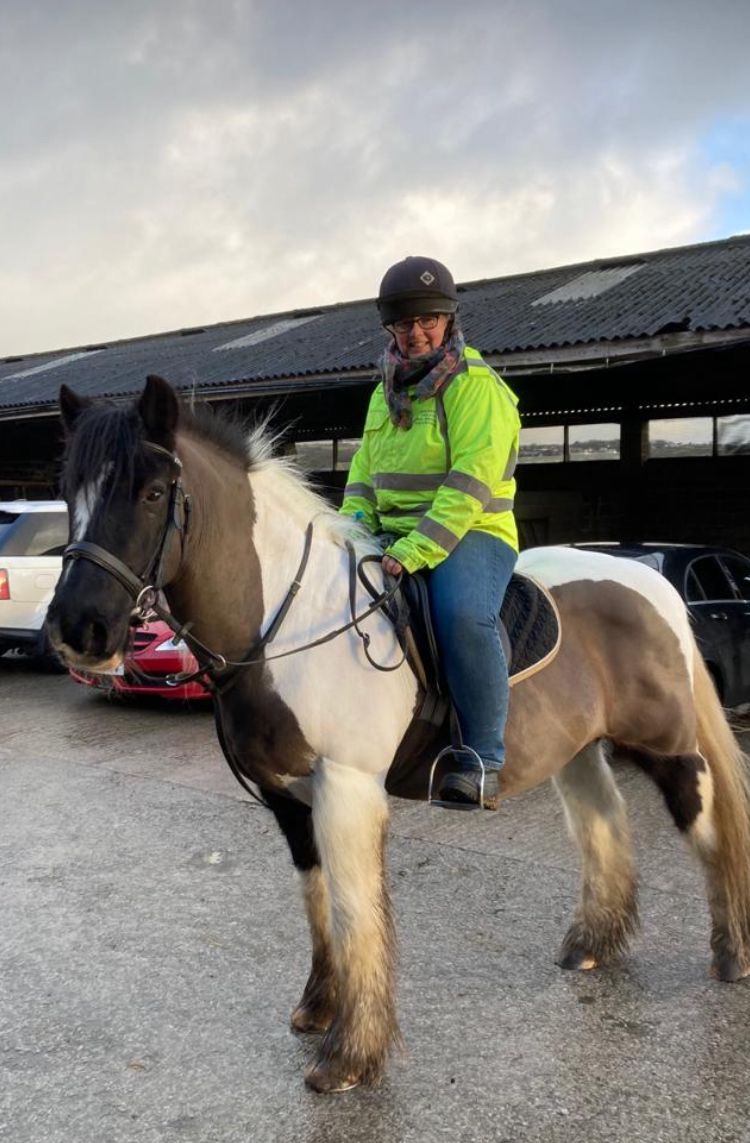
Allison and Ted, before a ride
Giving it a go is the greatest feeling
James Connell, Merseyside SLC member, tells us how sport has given him a renewed sense of confidence in all aspects of life.
“After suddenly going blind in 2011, it took me several months to adjust. I didn’t go out at first and was very depressed.
“I never thought I’d be able to participate in sport again, especially after gyms refused me membership due to health and safety concerns. However, in 2013, I began going on guided walks through local connections, and other supported activities. Despite enjoying them, they didn’t provide me with enough challenge.
“In 2017, I was encouraged to join parkrun with a guide runner. At first I was unsure if I could actually run 5km. Trust and confidence in your guide is essential, but also relaxing and enjoying it is just as important. As I became more confident, I completed a half marathon and even a triathlon. I found new friends amongst the ever-enthusiastic parkrun folk, and my confidence soared.
“In 2023, Rose, a guide runner, informed me that she was a personal trainer and boxer. I had always been interested in boxing but had never tried it myself. Now, I exercise with Rose at home every week, do mid-week runs, and also visit the gym for strength and fitness sessions.
“This June, I plan to do a sky dive, and I want to try paddle boarding, kayaking, and sailing when I can. Sport has significantly significantly improved my mental wellbeing, alongside the social aspect of connecting with supportive individuals.
“Sport has given me the confidence to pursue another passion of mine, stand-up comedy! I use comedy as a way of making people aware of VI challenges, and how sport and fitness helped me to overcome these.
“I would encourage anyone with sight loss to get involved with sport or fitness in general. If you’re unsure, then start small and build up. The sense of achievement and increased fitness, both mentally and physically, far outweigh any doubts you may have.
“Getting out there and just ‘giving it a go’ is the greatest feeling.”
Parkrun improves mental health
Alison Evans, East Sussex SLC member, took up running seven years ago, and has never looked back.
“Running… something I had never done, or thought I could ever do, until July 2016 when I completed my first Parkrun. Little did I know that eight years later I would be about to celebrate my 250th Parkrun.
“I can honestly say that joining Parkrun was one of the best things I have ever done. I have met so many lovely people, some of whom have become close friends and regular guides for me.
“Parkrun is friendly, it is a community, and at Parkrun you will never feel alone. There is also a social side to Parkrun. People often stay and have coffee afterwards, and when there are milestones or special events to celebrate then these almost always call for cake. After all, if you have just run or walked 5K then surely you have earned your cake!
“Parkrun is known to improve mental health and is often recommended by GPs and social prescribers. Running and Parkrun give me a great feeling of well being. I walk home after Parkrun feeling that I have done something positive, something which has benefited me both physically and mentally.
“I would encourage everyone to give Parkrun a go and not be put off by the word ‘run’.”
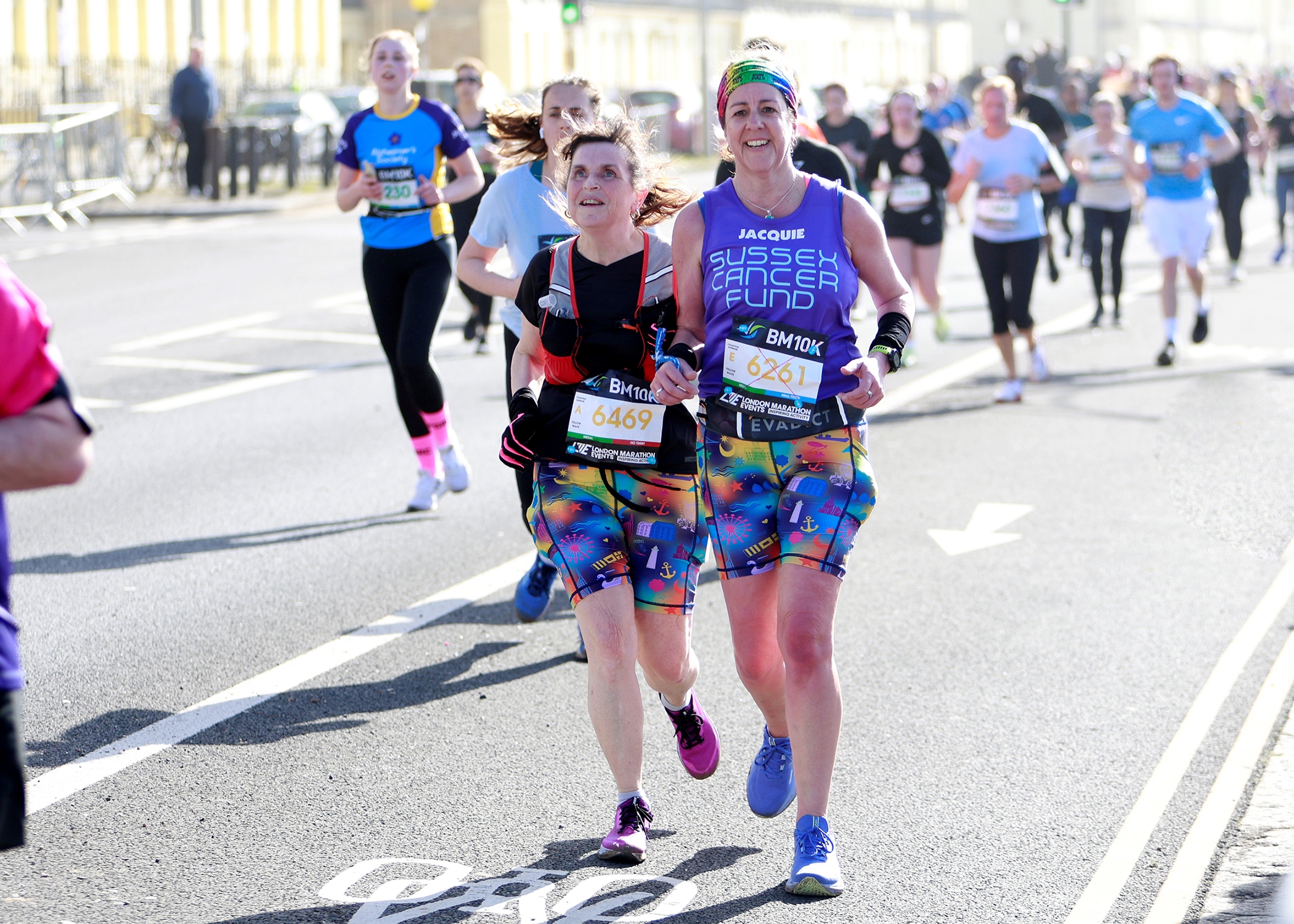
Alison and her guide runner, during a race
Being blind will not hold me back
Lancashire Sight Loss Council member, Lloyd Sakr, is a keen sailor. Below he shares his love of sailing and the positive impact it has on him.
“Whenever I go sailing, I am filled with a sense of freedom. It allows me to forget what is going on in life.
“A sailing boat is the one place on earth where I feel that being blind is not holding me back. While I am sailing, there is not a single thing that I am unable to do, and the freedom of steering a boat through the wind is amazing. With just minimal input from a sighted person, I feel in control of the boat’s course. You do not require sight to sense wind direction!
“It’s not just the sailing part of sailing that appeals to me, but also the social aspect. I have met so many people through various sailing trips. Few places offer the opportunity spend up to a week in a small space with people you have never met before, and this allows you to get to know your fellow crewmates very well.
“Outside of the sailing season, I really enjoy catching up with the friends I have made within the sailing community. Sailing has an amazing impact on my mental health. Every time I sail, I always return feeling like I have accomplished something. I would highly recommend anyone to give it a try.”
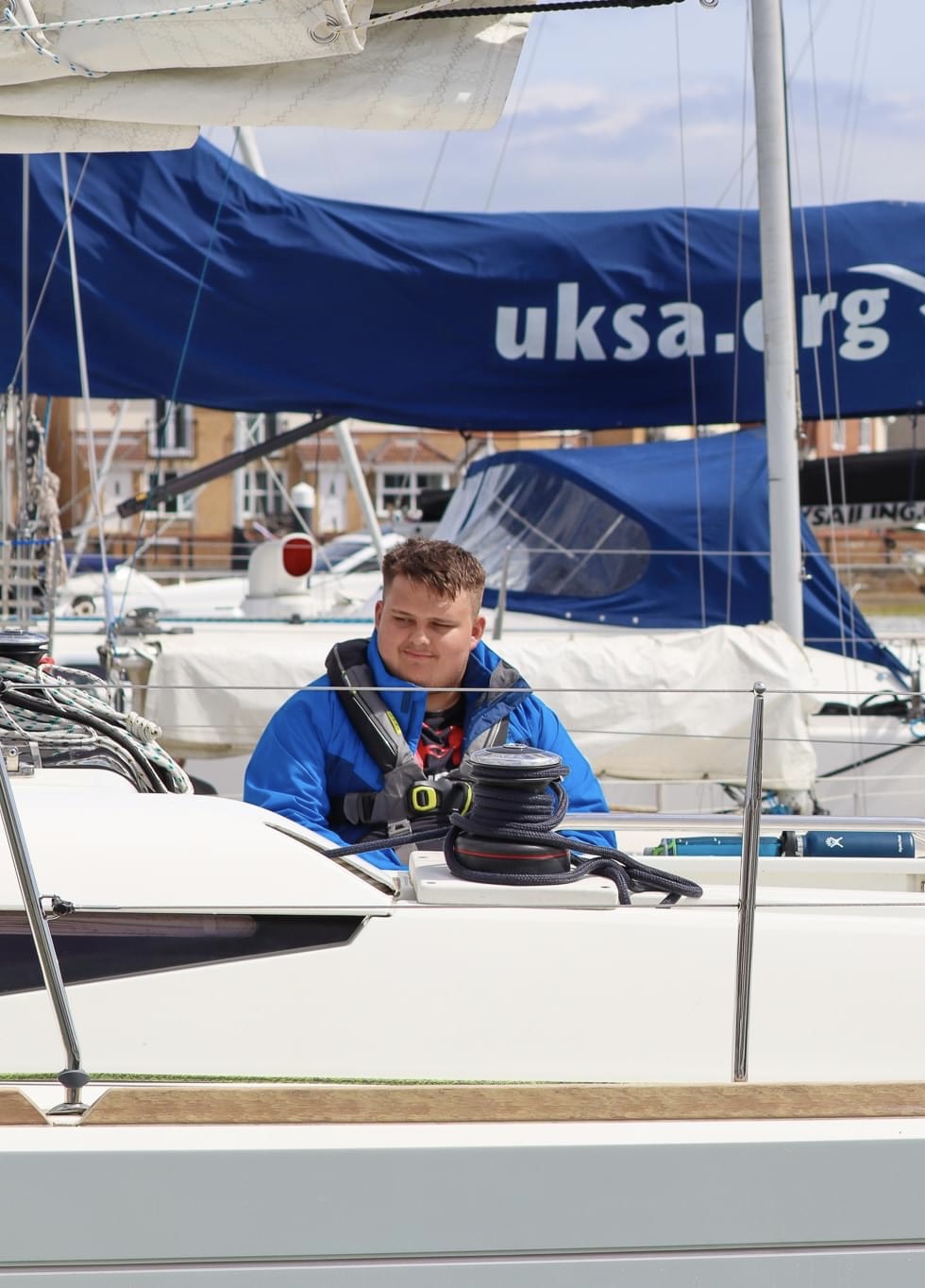
Lloyd, pictured on a sail boat
Thomas Pocklington Trust and Sight Loss Councils are also working together to increase the accessibility of sports and leisure centres, including through launching our joint report ‘Breaking Barriers: Improving Access for Blind and Partially Sighted Individuals in Leisure Facilities’.
Thomas Pocklington Trust has also released a toolkit with UK Coaching to help sports and leisure centre staff to understand how they can help to break down some of the barriers to participation.
Stay in the know
Want to get involved in our national campaigns? Stay up to date with news from Sight Loss Councils and Thomas Pocklington Trust by signing up to our mailing list.
Publication date: 13 May 2024

